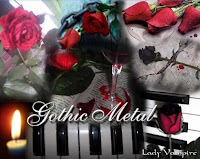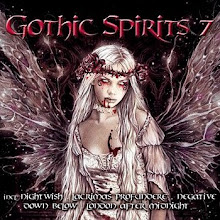Gothic is the same as goth, Gothdom, gothik etc. The only difference is noun or adjective use. Capitalization is often arbitrary. There is no general distinction between these terms. Any distinction made is often particular to a certain person or group who might use a different term to designate one of the different levels of involvement or divisions of gothics. For our purposes, we'll say these words are all intended to mean the same thing.
Gothic: Of or pertaining to a literary style of fiction prevalent in the late 18th and early 19th centuries which emphasized the grotesque, mysterious, and desolate: a gothic novel. [This is the relevant definition in the dictionary. Think of Mary Shelley's Frankenstein and the works of Edgar Allen Poe.]
But what does gothic mean in regards to the group of people? Here's where it gets confusing. There are things that many Goths like that are not gothic (Industrial or Classical music). There are things that are gothic that many Goths dislike (vampires, interest in death). There are things that some people think are gothic that are not gothic (bands like Marilyn Manson and Nine Inch Nails), and there are things that do not call themselves gothic even if they are considered gothic by most people (bands like Sisters of Mercy and Dead Can Dance). However, there's no Grand Gothic Judge to decree what is truly Goth and what is not, although there are plenty of people who claim to be it. It's an ambiguous label with many people using it that don't understand what it means. The people who do understand it often have many different definitions.
History and background:
The words Goth and Gothic have had many, largely unrelated meanings in the past:
the name of the Germanic Visigoth tribes that overthrew the Roman Empire. From this source arose the concept of a Goth as an uncivilized person, a barbarian. 4
a style of architecture in Western Europe which was popular from the 12th to the 16th century.
a style of horror/mystery literature that is dark, eerie and gloomy.
Goth, as a modern movement, started as one component of the punk rock scene. As the latter faded, Goth survived by creating its own subculture.
The first use of the term Goth in its present meaning is believed to have been on a British Broadcasting Corporation (BBC) TV program. Anthony H. Wilson, manager of Joy Division described the band as Gothic compared with the pop mainstream. The name stuck.
Their use of black clothing was originally "something of a backlash to the colorful disco music of the seventies." 5 It also stuck.
The movement first became established in the Batcave, a nightclub in London, England, in the early 1980's. 3
Spreading to the U.S., it first became popular in California.
Goth is featured in The Crow horror movies (1994, 1996). Other Gothic movies are the original Nosferatu, the color remake Nosferatu the Vampyre, and the Cabinet of Doctor Caligari.
Popular music bands are the Bauhaus, Siouxsie and the Banshees, the Sisters of Mercy, Dead Can Dance, and many others.
Read More..
Friday, March 6, 2009
History and Background (2)
talk about "gothic"
Gothic is the same as goth, Gothdom, gothik etc. The only difference is noun or adjective use. Capitalization is often arbitrary. There is no general distinction between these terms. Any distinction made is often particular to a certain person or group who might use a different term to designate one of the different levels of involvement or divisions of gothics. For our purposes, we'll say these words are all intended to mean the same thing.
Gothic: Of or pertaining to a literary style of fiction prevalent in the late 18th and early 19th centuries which emphasized the grotesque, mysterious, and desolate: a gothic novel. [This is the relevant definition in the dictionary. Think of Mary Shelley's Frankenstein and the works of Edgar Allen Poe.] But what does gothic mean in regards to the group of people? Here's where it gets confusing. There are things that many Goths like that are not gothic (Industrial or Classical music). There are things that are gothic that many Goths dislike (vampires, interest in death). There are things that some people think are gothic that are not gothic (bands like Marilyn Manson and Nine Inch Nails), and there are things that do not call themselves gothic even if they are considered gothic by most people (bands like Sisters of Mercy and Dead Can Dance). However, there's no Grand Gothic Judge to decree what is truly Goth and what is not, although there are plenty of people who claim to be it. It's an ambiguous label with many people using it that don't understand what it means. The people who do understand it often have many different definitions. People have accused or described Goths as being: Some of the above probably apply to some Goths, but definitely not to all.
History and background:
Stereotypes:
Read More..
Monday, March 2, 2009
Talk About Gothic Metal
Gothic is a term that is "difficult to pin down". Some commentators have suggested that there is an underlying Goth ideology, mindset or a set of common values but there is "little agreement about precisely what this might involve".The author Gavin Baddeley describes the gothic aesthetic in the following way.“ Gothic is sophisticated barbarism. It is a passion for life draped in the symbolism of death. It is a cynical love of sentiment. It is a marriage of extremes such as sex and death. It uses darkness to illuminate. It believes duty is vain, and vanity to be a duty. It is the compulsion to do the wrong thing for all the right reasons. It is a yearning nostalgia for the black days of a past that never was. It denies orthodox reality and puts its faith in the imaginary. It is the unholy, the uncanny, the unnatural. ”
The term gothic entered heavy metal music with the release of Paradise Lost's Gothic album in 1991.Since then, fans have often been at odds with one another as to "which bands are, or most definitely are not, authentically Gothic". Some musicians have disputed the gothic label associated with their bands, including Rozz Williams of Christian Death and Andrew Eldritch of The Sisters of Mercy. In the gothic metal subgenre, members from such groups as After Forever, HIM and Nightwish have similarly downplayed or dismissed the gothic label from their music.
Gothic metal or goth metal is a subgenre of heavy metal music. It combines the aggression of heavy metal with the dark melancholy of gothic rock. The genre originated during the early 1990s in Europe as an outgrowth of death/doom, a fusion of death metal and doom metal. The music of gothic metal is diverse with bands known to adopt the gothic approach to different styles of heavy metal music. Lyrics are generally melodramatic and mournful with inspiration from gothic fiction as well as personal experiences.
Pioneers of gothic metal include Paradise Lost, My Dying Bride and Anathema, all from the north of England. Other pioneers from the first half of the 1990s include Type O Negative from the United States, Tiamat from Sweden, and The Gathering from the Netherlands. Norwegian band Theatre of Tragedy developed the "beauty and the beast" aesthetic of combining aggressive male vocals with clean female vocals, a contrast that has since been adopted by many gothic metal groups. During the mid-1990s, Moonspell, Theatres des Vampires and Cradle of Filth brought the gothic approach to black metal. By the end of the decade, a symphonic metal variant of gothic metal had been developed by Tristania and Within Temptation.
In the 21st century, gothic metal has moved towards the mainstream in Europe, particularly in Finland where groups such as The 69 Eyes, Entwine, HIM, Lullacry, Poisonblack and Sentenced have released hit singles or chart-topping albums. In the US, however, only a few bands such as Lacuna Coil, Nightwish, and Evanescence have found commercial success.
The music of gothic metal is generally characterised by its dark atmosphere. The adjective "dark" is commonly used to describe gothic music in general while other terms that are less frequently used include deep, depressing, romantic, passionate and intense. Gothic metal has also been described as "a combination of the darkness and melancholy of goth rock with heavy metal". Allmusic defines the genre as a fusion of "the bleak, icy atmospherics of goth rock with the loud guitars and aggression of heavy metal" and further notes that "true goth metal is always directly influenced by goth rock - ethereal synths and spooky textures are just as important as guitar riffs, if not moreso"
Read More..


